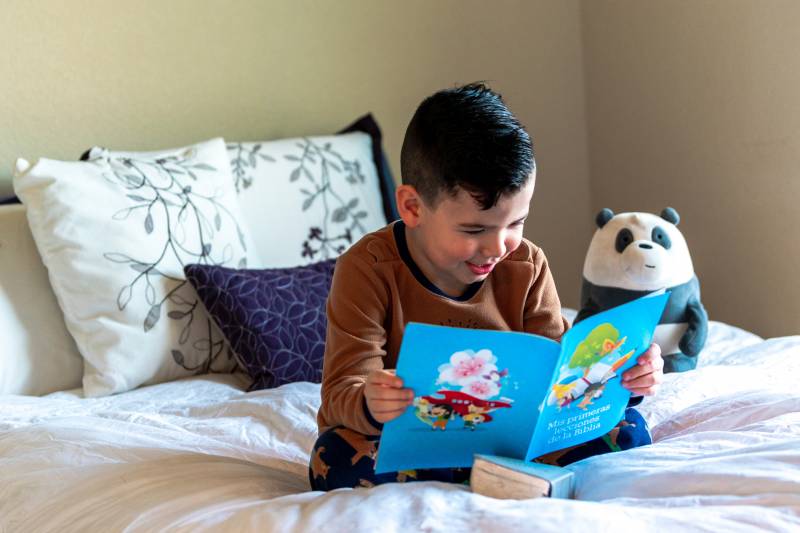
Parents, as children move from grade to grade, throughout the years, you are the teacher that stays with them. Thus, you are uniquely qualified to meet their educational needs, as well as their social and emotional needs. The recent pandemic caused many of you to take a more active role in your children's formal education, and you have done a better job than you think that you have. Instead of focusing on what you were not able to provide that schools provide, focus on the ways that your children have benefited from being with you.
I am Dr. Tina Marshall-Bradley, and I'm an academic coordinator in the masters of the education program and the Richard W. Riley College of Education and Leadership at Walden University. I would like to take a moment to celebrate all educators and to remind parents and caregivers that not only are you your children's first teachers, you're also their consistent teachers.
Here are four ways that children may be benefiting from being away from school. The first is a more flexible schedule. Some of you may have children who are rays of sunshine in the morning, but they begin to wilt right around lunchtime, while their siblings on the other hand could spend an hour or two longer in the bed, and that would set the stage for a positive day for them.
There in fact is some research to support that during adolescence, some individuals may benefit from starting their days a little later. Outside of the school environment, students can optimize learning by taking advantage of being able to respond to their natural circadian rhythm, as opposed to a preset time for the day's activities to start.
The second advantage of you managing more of your children's learning experiences is the opportunity for students to explore their own interests. The technical skills that may be lost because students are not following a structured curriculum, may be replaced by students learning how to learn as they engage with topics that they are interested in as opposed to topics said by schools and educators.
Some of those skills might include research skills, networking, as well as advanced communication as students seek information on topics of interest to them towards a purpose that makes sense to them. The third area where children may see an upside to not being in school is more time alone with nothing to do. Some people may call this boredom, and typically being bored is seen as negative, however, in a world where people are bombarded with information from the very time that they are born, opportunities not to be stimulated are rare but very necessary.
They're especially necessary for growing minds. These quiet moments are essential for young children. It is through these still moments that children learn about themselves as well as their environment.
Benefits of Educating at Home
The fourth advantage of young people being away from structured school environments can be discovering various opportunities and engaging in unique experiences. These might be things that were available to them all of the time, but they were not able to take advantage of the opportunities or experiences because they were in school.
The video conference gatherings with family members may have connected them with distant relatives in a variety of age groups. They could be developing important life skills as they provide support to a parent who is running their own business, or they may have the experience of visiting zoos, aquariums, museums, and nature reserves virtually. These experiences that are not typically available in schools have the potential to pique children's interest, as well as their curiosity in a variety of ways.
The first and natural instinct to a change as drastic as the change caused by the current pandemic is typically distress. Families doubted their abilities to match the work that schools were doing with their children. For many families, there were too many other life changes for them to worry about not doing a good job of replicating the school experience, and they stopped trying.
For others, life changes necessitated that children take on roles and responsibilities that they could not do because they were in school. As families continue their lives during the summer and examine what may possibly happen when schools are open to receive children, it is my hope that adults will reflect on lessons learned and embrace the positive experiences with their children and continue to embrace their role as teachers.
It has been said that children learn more from what you are than from what you teach. Now maybe a good time to reflect on who we are as individuals, and to see how much our children will always learn from us.
Check more of this series here: https://www.learningsuccesssystem.com/tips/unexpected-benefits-educating-at-home
Key Takeaways:
Do You Need help with a Learning Difficulty?
Our simple online analysis will help you get to the core of the problem and find the right solution for you.
Understanding how to help someone with a learning difficulty starts with understanding which micro-skills are affected. When you learn which of the micro-skills is the problem, you will then be on your way to solving it.
You'll also learn how to:
- Build confidence
- Enhance Learning ability
- Eliminate avoidance
- Build grit
You can get this analysis for free by filling out this simple form. This will help you get to the bottom of a learning difficulty and provide you with a solution. If you are ready to put this problem behind you click the button below and fill out the form.










